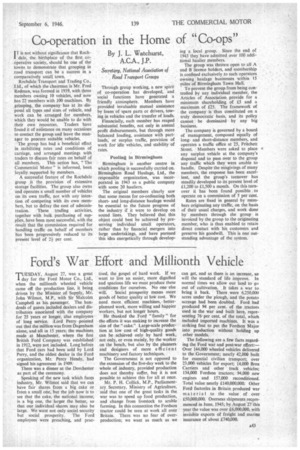Ford's War Effort and Millionth Vehicle
Page 45

If you've noticed an error in this article please click here to report it so we can fix it.
'TUESDAY, August 27, was a great I day for the Ford Motor Co., Ltd., when the millionth wheeled vehicle came off the production line, it being driven by the Minister of Supply, Mr. John Wilmot, M.P.. with Sir Malcolm Campbell as his passenger. The hundreds of guests included dealers and distributors associated with the company for 25 years or longer, also employees of long service. Lord Perry pointed out that the million was from Dagenham alone, and all in 15 years; the machines made at Manchester, where the first British Ford Company was established in 1912, were not included. Long before that Ford cars had been sold by Lord Perry, and the oldest dealer in the Ford organization, Mr. Percy Bendy, had signed his agreement in NI9.
There was a dinner at the Dorchester as part of the ceremony.
Speaking of the new task which faces industry, Mr. Wilmot said that we can have fair shares from a big cake or from a small one, but the job now is to see that the cake, the national income, is a big one, the larger the better, so that our individual shares may also be large. We want not only social security but social prosperity. The Ford employees were preaching, and prac
tised, the gospel of hard work. If we want to live an easier, more dignified and spacious life we must produce these conditions for ourselves. No one else will. Social prosperity means more goods of better quality at low cost. We need, more efficient machines, betterplanned work, more willing and happier workers, but not longer hours.
He thanked the Ford " family " for the efforts it was making to increase the size of the "cake?' Large-scale production at low cost of high-quality goods can be achieved only by hard work, not only, or even mainly, by the worker on the bench, but also by the planners and designers of more efficient machinery and factory techniques.
The Government is not opposed to the extension of the five-day week to the whole of industry, provided production does not thereby suffer, but it is not possible to achieve this for all at once.
Mr. P. H. Collick, M.P., Parliamentary Secretary, Ministry of Agriculture, said that one of the great tasks in the. war was to speed up food production, and change from livestock to arable farming. In this connection the Fordson tractor could be seen at work all over Britain. There was no fear of overproduction; we want as much as we
can get, and as there is an increase, so will the standard of life improve. In normal times we allow our land to go out of cultivation. It takes a war to bring it back. There were 6,250,000 acres under the plough, and the potato acreage had been doubled. Ford had produced 94 per cent, of the tractors used in the war and built here, representing 76.per cent, of the total, which included imported machines. It was a striking feat to put the Fordsort Major into production without holding up other models.
The following are a few facts regarding the Ford war and post-war effort:— Over 144,000 wheeled vehicles delivered to the Government; nearly 42,000 built for essential civilian transport; over 23,000 vehicles for export; 14,000 Bren Carriers and other track vehicles; 134,000 Fordson tractors; 94,000 new
• engines and 157,000 reconditioned. Total value nearly £140,000,000. Other Ford factories in Britain produced war material to the value of over £50,000,000. Overseas shipments recommenced in June, 1945; by August 27 this year the value was over £6,000,000, with invisible exports of freight and marine insurance of about £740,000.




































































